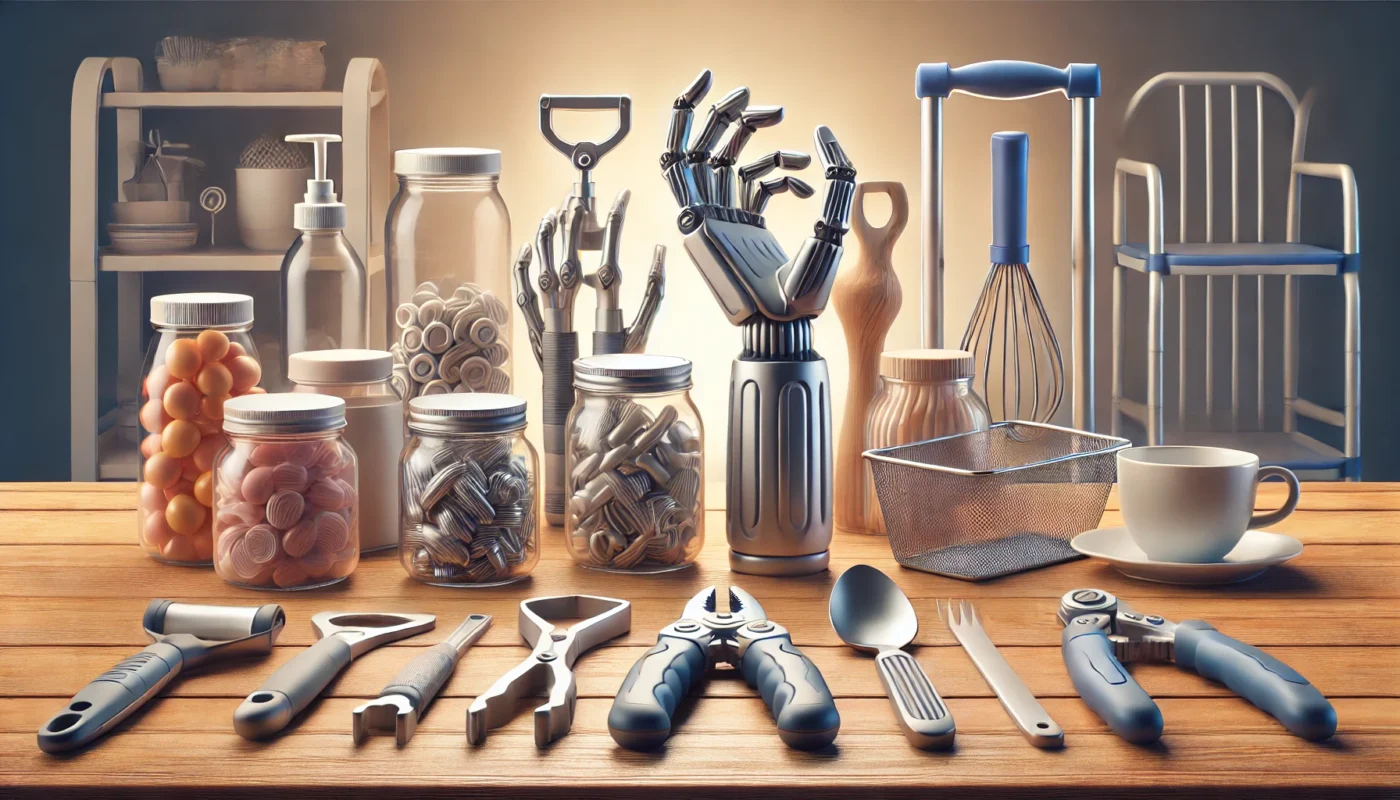Rheumatoid arthritis (RA) is a chronic condition that can significantly impact daily life. It’s characterized by inflammation in the joints, leading to pain and stiffness.
But living with RA doesn’t mean giving up on the activities you love. With the right tools and strategies, you can manage your symptoms and maintain a high quality of life.
This guide will introduce you to a range of rheumatoid arthritis products. These are designed to help manage your condition and enhance your wellbeing.
We’ll delve into the science behind these products. We’ll also provide practical advice on how to use them effectively.
From assistive devices to dietary supplements, we’ll cover a wide range of tools. We’ll also explore holistic and alternative approaches to managing RA.
Whether you’re a fitness enthusiast adapting your routine, a health enthusiast seeking new strategies, or a medical patient looking for practical tips, this guide is for you.
Our goal is to empower you with knowledge. We want to help you make informed decisions about your health and wellbeing.
So, let’s dive in and explore the essential tools for managing rheumatoid arthritis.
You May Also Like: Natural NSAIDs: Benefits and Side Effects
Understanding Rheumatoid Arthritis
Rheumatoid arthritis is an autoimmune condition affecting millions worldwide. It occurs when the immune system mistakenly attacks healthy joint tissues. This results in inflammation and joint damage, causing significant discomfort.
The exact cause of RA remains unclear. However, genetic, environmental, and hormonal factors are thought to play roles. Smokers and individuals with a family history of RA face higher risks.
RA affects more than just joints. It can impact other systems like the skin, eyes, and lungs. Early recognition and intervention are crucial for managing these potential complications.
Key characteristics of RA include:
- Symmetrical joint involvement
- Morning stiffness lasting over an hour
- Warm, swollen, and tender joints
The severity of RA symptoms can vary widely. Some people experience mild discomfort, while others endure severe pain and disability. Flare-ups, periods of increased symptoms, can occur unpredictably.
Understanding RA’s nature helps set realistic expectations and goals. Knowledge empowers individuals to engage in proactive RA management. It allows them to make informed decisions about treatments and lifestyle adjustments.
The Importance of Early Diagnosis and Treatment
Diagnosing RA early is crucial. It helps to initiate treatment promptly, reducing joint damage. Left untreated, RA can lead to significant joint destruction.
Early treatment involves a combination of medications and lifestyle changes. It aims to control inflammation and prevent joint damage. Disease-modifying antirheumatic drugs (DMARDs) are often the first line of treatment.
Timely diagnosis also allows for better disease monitoring. Regular check-ups help track disease progression. They enable healthcare providers to adjust treatment plans as needed, optimizing health outcomes.
Recognizing Common Symptoms and Their Impact
Common symptoms of RA include joint pain, swelling, and stiffness. These symptoms often start in smaller joints, like fingers and toes, and can progress to larger joints.
Morning stiffness that lasts more than an hour is a hallmark of RA. It’s often accompanied by fatigue and a general feeling of unwellness. These symptoms can significantly affect daily activities and quality of life.
RA can also lead to joint deformity if not properly managed. Regular monitoring and treatment adjustments are crucial. They help reduce the disease’s impact on physical function and overall wellbeing.

Medication and Supplements for RA Management
Managing rheumatoid arthritis effectively often requires a multifaceted approach. Medications play a central role in alleviating symptoms and controlling disease progression. Supplements can also complement conventional treatment plans, potentially reducing inflammation and joint pain.
A comprehensive RA management plan combines pharmaceuticals and lifestyle modifications. Disease-modifying antirheumatic drugs (DMARDs), biologics, and corticosteroids are commonly prescribed. Each class of medication addresses different aspects of the disease process.
While medications are essential, not everyone responds the same way. It may take time to find the most effective combination. Regular consultations with healthcare professionals are vital for monitoring effectiveness and side effects.
In addition to prescribed drugs, some people explore supplements. These are used to augment prescribed treatment and potentially enhance outcomes. They include natural anti-inflammatory agents and other supportive compounds.
The Role of Medication in Managing Symptoms
Medications are fundamental in managing RA symptoms. They help reduce inflammation and prevent joint damage. Nonsteroidal anti-inflammatory drugs (NSAIDs) can alleviate pain and swelling.
DMARDs like methotrexate slow disease progression. These drugs target the immune response. Biologics are another option, offering targeted intervention for severe cases.
Supplements That Can Help with RA
Supplements can play a supportive role in managing RA. Fish oil is rich in omega-3 fatty acids, which reduce inflammation. It may help lower the intensity of joint pain and stiffness.
Turmeric, with its active compound curcumin, offers anti-inflammatory benefits. It’s often recommended for reducing RA symptoms. Always discuss any new supplements with your healthcare provider to ensure safety.
Assistive Devices and Adaptive Equipment
Rheumatoid arthritis can significantly impact daily activities. Using the right tools can make a profound difference. Assistive devices and adaptive equipment are invaluable for reducing joint strain and enhancing independence.
These tools come in many forms, each serving a distinct purpose. Some focus on reducing the physical burden of daily tasks. Others aim to improve mobility and safety, promoting a more active lifestyle.
Investing in well-designed equipment can improve quality of life. For example, kitchen aids can ease food preparation. Devices for personal care can simplify grooming tasks.
Selecting the right products requires attention to individual needs. Consulting with an occupational therapist can provide guidance. They can recommend devices tailored to specific challenges.
Maintaining an active lifestyle is crucial for managing RA. Mobility aids can help keep you moving with confidence. Improved mobility reduces the risk of falls and enhances participation in activities.
Adaptive tools should be user-friendly and durable. They should not only aid in tasks but also promote a sense of autonomy. Feeling in control is key to managing rheumatoid arthritis effectively.
Tools to Reduce Joint Strain and Enhance Mobility
Reducing joint strain is critical for those with rheumatoid arthritis. Specific tools are designed to minimize stress on affected areas. These gadgets can extend independence and improve overall wellbeing.
Mobility aids provide stability and support. They include canes, walkers, and rollators. These tools can enhance balance, making walking safer and more comfortable.
To ease movement in the home, consider installing grab bars. Reachers and ergonomic door handles are also helpful. They’re designed to minimize bending and gripping, reducing joint strain.
- Canes and walkers for stability
- Grab bars for bathroom safety
- Reachers for extending reach
Proper use of these devices can significantly enhance mobility. They allow for greater participation in daily activities. The focus is on maintaining independence and reducing joint stress.
Ergonomic and Adaptive Tools for Daily Living
Integrating ergonomic tools into daily routines can be transformative. These products reduce physical strain and improve efficiency. They cater to those with limited dexterity due to RA.
Kitchen gadgets can make cooking more manageable. Look for easy-grip handles and non-slip surfaces. Jar openers and lightweight cookware can reduce hand strain.
Adaptive clothing and accessories simplify dressing. Velcro fastenings and elastic waistbands reduce the need for fine motor skills. Button hooks and zipper pulls further ease dressing tasks.
- Easy-grip kitchen tools
- Adaptive clothing with Velcro fastenings
- Button hooks for simplified dressing
These tools focus on functionality and comfort. They make routine tasks more accessible, which is essential for maintaining a sense of normalcy. With the right support, you can effectively manage RA challenges in daily life.
Holistic and Alternative Approaches to RA
Holistic and alternative approaches can offer valuable support in managing rheumatoid arthritis. These methods focus on the whole person, emphasizing balance and overall wellbeing. Integrating these strategies with conventional treatment may enhance outcomes and improve quality of life.
Mind-body practices play a crucial role in this approach. Techniques such as yoga, meditation, and tai chi can be particularly beneficial. They promote relaxation, reduce stress, and may even aid in pain relief and flexibility.
Dietary changes and supplements often complement these practices. An anti-inflammatory diet rich in omega-3 fatty acids, found in fish oil, can help manage symptoms. Additionally, turmeric and its active ingredient curcumin have shown potential in reducing joint inflammation.
- Yoga, meditation, and tai chi for stress reduction
- Fish oil and turmeric supplements for inflammation
- Anti-inflammatory diets to support symptom management
Together, these holistic measures can contribute to a balanced approach to RA management. By addressing both body and mind, they support comprehensive care and symptom relief. Always consult healthcare professionals before starting any new alternative therapies.
The Benefits of Physical Therapy and Exercise
Physical therapy and exercise are cornerstone treatments for rheumatoid arthritis. They help maintain joint function and enhance muscle strength. Regular movement can prevent stiffness and reduce fatigue.
Tailored exercise programs ensure that activities are safe yet effective. Physical therapists design these routines to meet individual needs. They focus on improving flexibility, mobility, and overall fitness.
Exercise can boost mood and energy levels. It promotes better sleep, often disturbed by pain. Adequate rest aids in recovery and overall wellbeing.
Complementary Therapies for RA Relief
Complementary therapies can enhance traditional RA treatments. Acupuncture, for instance, may help alleviate pain and improve function. It’s a well-regarded option for those seeking additional relief.
Massage therapy is another effective method. It targets muscle relaxation and tension reduction. By improving circulation, it may reduce swelling and discomfort.
Exploring these therapies with professional guidance is essential. They can be integrated safely with other treatments. This broadens the scope of RA management beyond conventional approaches.

Lifestyle Changes and Home Modifications
Adopting certain lifestyle changes and home modifications can significantly improve life with rheumatoid arthritis. Simple adjustments can enhance comfort and functionality. These changes aim to alleviate stress on joints and increase overall wellbeing.
Prioritizing rest is essential. It helps manage fatigue, a common symptom. Balancing activity with rest can prevent exacerbating symptoms and improve energy levels throughout the day.
Implementing ergonomic principles in daily tasks minimizes joint strain. Using assistive devices like jar openers or specially designed utensils can make life easier. These tools help perform tasks without unnecessary stress on painful joints.
- Prioritize rest and manage fatigue
- Use ergonomic tools for daily tasks
- Implement assistive devices for common chores
Adaptations at home can also make a big difference. Moving items to easy-to-reach places and reducing clutter prevents strain and the risk of falls. Lever-style door handles can replace traditional knobs to enhance accessibility.
Diet and Nutrition for Reducing Inflammation
Nutrition plays a key role in managing rheumatoid arthritis symptoms. A diet high in anti-inflammatory foods can reduce joint pain and swelling. Incorporating omega-3 rich foods, like fatty fish, is beneficial.
Fruits, vegetables, and whole grains are vital components. They provide essential nutrients and antioxidants that combat inflammation. Limiting processed and sugary foods further aids in symptom control.
Home and Workplace Adaptations
Both home and workplace environments should support RA management. Simple modifications can improve comfort and reduce joint stress. These changes help maintain independence and productivity.
Incorporating ergonomic furniture and tools at work can prevent discomfort. Adjustable chairs and desks promote good posture. Ensuring ergonomic setup enhances efficiency and reduces fatigue.
At home, consider handrails and grab bars in key areas. These modifications offer support and stability. Accessible layouts and adaptive technologies foster a safe, comfortable living space.
Technology and Apps for RA Management
Modern technology plays a pivotal role in managing rheumatoid arthritis effectively. Various apps and devices offer valuable support for individuals with RA. They assist in tracking symptoms, planning medication schedules, and enhancing daily living.
Mobile applications can simplify the management of RA. They provide users with tools to monitor symptoms and log medication intake. These features help track disease progression and ensure adherence to treatment plans.
Smart home devices and assistive technology further aid in daily tasks. Voice-activated systems and automated gadgets reduce physical effort. These innovations enhance quality of life and independence for RA sufferers.
- Use mobile apps for tracking symptoms
- Employ smart home devices to ease daily living
- Integrate assistive technology for added support
Mobile Apps for Symptom Tracking and Medication Reminders
Several apps are designed to help manage rheumatoid arthritis. These applications track symptoms and alert users about medication schedules. This functionality ensures consistency in managing RA.
Keeping a digital symptom diary helps identify patterns and triggers. Such insights facilitate informed discussions with healthcare providers. Timely medication reminders contribute to better treatment adherence and symptom control.
Smart Home Devices and Assistive Technology
Smart home devices bring convenience and ease into daily life. Voice assistants and automated systems minimize physical strain. For example, controlling lights and temperatures hands-free reduces joint stress.
Assistive technology can also aid those with limited hand function. Devices like speech-to-text software enhance communication. These tools ensure tasks are performed with minimal pain and discomfort.
Building a Support Network and Mental Health Strategies
Managing rheumatoid arthritis isn’t just about physical health. Emotional wellbeing is equally crucial for those living with RA. Building a robust support network can provide significant psychological benefits.
Connecting with others who understand RA challenges can ease feelings of isolation. Online forums and local support groups offer opportunities for shared experiences. Engaging with these communities can lead to valuable friendships and support.
Mental health strategies are also essential. Stress and anxiety can exacerbate RA symptoms. Therefore, incorporating mental wellness practices into daily routines is vital.
Consider creating a balanced plan that includes both support from others and individual coping techniques. This combination can enhance resilience and improve overall quality of life.
- Join a support group or online community
- Explore stress-relief techniques
- Prioritize mental health alongside physical health
The Importance of Social Support and RA Communities
Social support plays a crucial role in managing RA. Having a network of friends or a community can lessen emotional burdens. Shared experiences provide comfort and understanding.
Engaging with RA communities offers practical advice and emotional relief. These interactions can foster a sense of belonging. Feeling connected can significantly impact an individual’s outlook and motivation.
Coping Strategies and Mental Health Resources
Developing effective coping strategies is important for RA management. Practicing mindfulness and meditation can reduce stress. These practices promote relaxation and help focus on the present.
Additionally, mental health resources like therapy can provide professional guidance. Speaking to a counselor can alleviate anxiety and depression symptoms. Utilizing these resources strengthens emotional resilience while living with RA.

Conclusion and Next Steps
Managing rheumatoid arthritis effectively involves a comprehensive approach. Incorporating medications, lifestyle changes, and support systems can lead to better outcomes. Holistic and alternative treatments can complement traditional methods.
Taking proactive steps toward management enhances quality of life. Prioritize learning about new tools and strategies. Set realistic goals for health improvements. It’s important to stay informed and open to trying different approaches.
Engage with healthcare providers, explore supportive networks, and make informed choices. Continuously adapt strategies to personal needs. With diligence, living well with rheumatoid arthritis is achievable.
Further Reading:
Mayo Clinic: Rheumatoid arthritis
Health Central: 13 Great Gadgets That Make Life With RA Easier
National Library of Medicine: Rheumatoid arthritis: Learn More – Daily living aids for people with rheumatoid arthritis
rheumatoid arthritis, lifestyle changes, home modifications, ergonomic tools, nutrition, inflammation, technology, mobile apps, support network, mental health, coping strategies, assistive technology, wellness, healthcare, chronic illness management
Important Note: The information contained in this article is for general informational purposes only, and should not be construed as health or medical advice, nor is it intended to diagnose, prevent, treat, or cure any disease or health condition. Before embarking on any diet, fitness regimen, or program of nutritional supplementation, it is advisable to consult your healthcare professional in order to determine its safety and probable efficacy in terms of your individual state of health.
Regarding Nutritional Supplements Or Other Non-Prescription Health Products: If any nutritional supplements or other non-prescription health products are mentioned in the foregoing article, any claims or statements made about them have not been evaluated by the U.S. Food and Drug Administration, and such nutritional supplements or other health products are not intended to diagnose, treat, cure, or prevent any disease.

